Mark Anthony Neal's Blog, page 693
October 3, 2015
Baltimore Author D. Watkins Discusses The Beast Side: Living (and Dying) While Black in America'
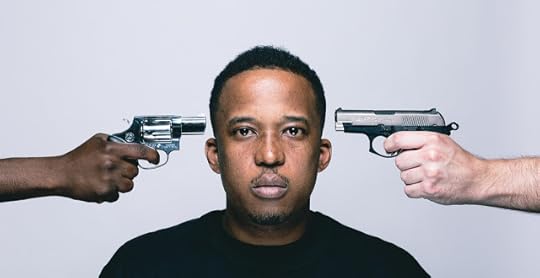
'Author D. Watkins says that crack destroyed his East Baltimore neighborhood, and he explains how the real day-to-day of selling drugs is nothing like the movies. Watkins gave up dealing drugs and now has three degrees, including a master of education from Johns Hopkins University and a master of fine arts in creative writing from the University of Baltimore. His new book is The Beast Side: Living (and Dying) While Black in America. ' -- NPR
Published on October 03, 2015 04:28
October 2, 2015
For Whom We Ask Grace: Michael Vick, The Hypocrisy of NFL Fans and America
 For Whom We Ask Grace: Michael Vick, The Hypocrisy of NFL Fans and Americaby Lawrence Ware | @Law_Ware | NewBlackMan (in Exile)
For Whom We Ask Grace: Michael Vick, The Hypocrisy of NFL Fans and Americaby Lawrence Ware | @Law_Ware | NewBlackMan (in Exile)Steelers fans need to do some soul searching.
When Michael Vick was signed as the backup quarterback for Pittsburgh, the reaction was vitriolic. There were protests. There was outrage. There were candlelight vigils for the victims of his criminal malfeasance. Even though his hire made football sense given Roethlisberger’s propensity for injury, a number of fans were incensed and vowed to never support Vick. All that moralizing will be put to the test over the next 4-6 weeks.Recently, Roethlisberger suffered a knee sprain and bone bruise as he was tackled by Rams safety Mark Barron. Many are calling it a dirty play, but Roethlisberger maintains that it was a clean hit. This sets the stage for what I knew would happen: Steelers fans that protested the signing of Michael Vick will have to decide if they will cheer for him as he quarterbacks the team. As for me, I want Vick to do well. I want him to excel. He is a man who made mistakes, his actions were inexcusable, but I refuse to allow a person’s missteps be the defining characteristic of their lives—especially if they go out of their way to right the wrongs they have done. Vick cannot change the past. The dogs that died cannot be resurrected. The animals tortured cannot be made whole. But what Vick can do is raise awareness to animal cruelty…and he has done that. In fact, he has gone beyond what the courts required him to do. Many will say he did all this because he wants to rehabilitate his public personae. That he is not truly remorseful—this may be true. Or it may be that he is deeply, genuinely sorry for the wrong he has done. After all, it is possible for a man to have a change of heart. I can’t call it. Animal rights activists can’t either. But what I will not do is remain silent while unforgiving dog lovers bully a man they don’t know. Call me a Christian. Call me someone who believes in second chances. Call me a man who once needed grace and is able to have compassion for another who needs some of his own. Nevertheless, what this shows us is how hypocritical Americans can be in how we treat those who have made legal mistakes. In Discipline and Punish, Michel Foucault said: “We are now far away from the country of tortures, dotted with wheels, gibbets, gallows, pillories; we are far, too, from that dream of the reformers, less than fifty years before.” He is right. Long gone are the days of tar and feathers; we do not put criminals in stocks for everyone to see. We like to think of ourselves as a country invested in giving people second chances. Yet, in spite of this, we force ex-offenders to mark a box that informs employers of their criminal record; we unapologetically treat people who have broken the law like criminals instead of otherwise good people who have made the mistake of committing a crime; we are stigmatizing of the black and brown people who tend to commit blue collar crimes, but we are forgiving of the mostly white and wealthy folks who commit white-collar crimes. Americans need to reexamine how we treat prisoners. We need to see how our attitudes toward those with criminal records contributes to the fact that we hold 25% of the world’s population of prisoners, and how this disproportionately affects people of color. So I will be cheering for Vick. Not because I am a fan of the Steelers; nor because I agree with the mistakes he’s made—but like Bomani Jones, I want to see people to confront their own hypocrisy. Play well Vick. I’m pulling for you.+++Lawrence Ware is a professor of philosophy and diversity coordinator for Oklahoma State University’s Ethics Center. A frequent contributor to the publication The Democratic Left and contributing editor of the progressive publication RS: The Religious Left, he has also been a commentator on race for the HuffPost Live, CNN, and NPR.
Published on October 02, 2015 10:00
October 1, 2015
What Hip-Hop can Learn from #BlackLivesMatter
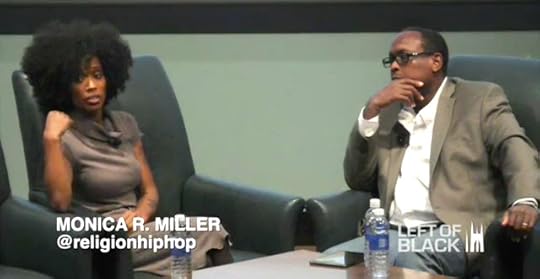 On this episode of
Left of Black on The Root
, host Mark Anthony Neal talks with Professor Monica R. Miller on location at Lehigh University. Professor Miller is the author of
Religion and Hip-Hop
and the co-editor of
Religion in Hip-Hop: Mapping the New Terrain in the US.
On this episode of
Left of Black on The Root
, host Mark Anthony Neal talks with Professor Monica R. Miller on location at Lehigh University. Professor Miller is the author of
Religion and Hip-Hop
and the co-editor of
Religion in Hip-Hop: Mapping the New Terrain in the US.
Published on October 01, 2015 20:41
The Global African: Alicia Garza on #BlackLivesMatter
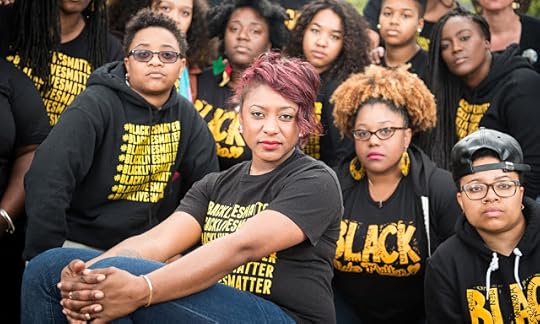 . +The Global African host Bill Fletcher, Jr. talks with Alicia Garza about Black Lives Matter Network, and what’s next for the organization. Fletcher also talk with Patrick Connors about Lev Leviev's diamonds and his connection to settlements in the West Bank.'
. +The Global African host Bill Fletcher, Jr. talks with Alicia Garza about Black Lives Matter Network, and what’s next for the organization. Fletcher also talk with Patrick Connors about Lev Leviev's diamonds and his connection to settlements in the West Bank.'
Published on October 01, 2015 20:28
PBS NewsHour: Why Greater Diversity is Good for Hollywood’s Bottom Line
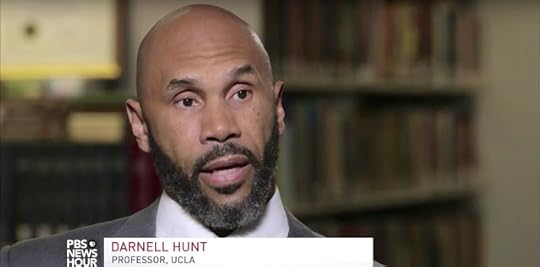 'A record number of African-American actors won Emmy Awards for their performances on television this year, but the entertainment industry often still doesn’t reflect the full diversity of America. +PBS NewsHour Special correspondent Charlayne Hunter-Gault talks with Darnell Hunt of UCLA about the underrepresentation of people of color and women on screen and behind the camera.'
'A record number of African-American actors won Emmy Awards for their performances on television this year, but the entertainment industry often still doesn’t reflect the full diversity of America. +PBS NewsHour Special correspondent Charlayne Hunter-Gault talks with Darnell Hunt of UCLA about the underrepresentation of people of color and women on screen and behind the camera.'
Published on October 01, 2015 20:20
Art of the MOOC: Merging Public Art & Experimental Education [video]
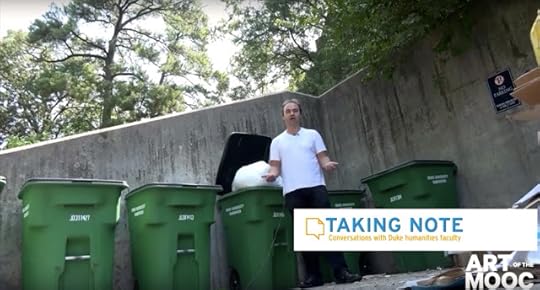 'Duke University Art Professor
Pedro Lasch
is co-teaching a rare massive open online course focusing on public art. The free digital course debuts on the Coursera education platform Oct. 19.'
'Duke University Art Professor
Pedro Lasch
is co-teaching a rare massive open online course focusing on public art. The free digital course debuts on the Coursera education platform Oct. 19.'
Published on October 01, 2015 20:12
September 30, 2015
#TheRemix: Bestselling Author Adam Mansbach Drops the F-bomb on Parenting
 #TheRemix
Host James Braxton Peterson talks with Best-Selling Author Adam Mansbach about the challenges of parenting, and the darkly comic New York Times Best-Seller that was birthed by those challenges. Mansbach is author of "Angry White Black Boy", "The End of the Jews", "Rage is Back" and the supernatural thrillers The Dead Run and The Devil's Bag Man. His newest book is historical fiction for children entitled "Benjamin Franklin: Huge Pain in my Ass".
#TheRemix
Host James Braxton Peterson talks with Best-Selling Author Adam Mansbach about the challenges of parenting, and the darkly comic New York Times Best-Seller that was birthed by those challenges. Mansbach is author of "Angry White Black Boy", "The End of the Jews", "Rage is Back" and the supernatural thrillers The Dead Run and The Devil's Bag Man. His newest book is historical fiction for children entitled "Benjamin Franklin: Huge Pain in my Ass".
Published on September 30, 2015 19:17
Africans Left Behind by a Two-tier Refugee System
 'A photo of drowned three-year-old Alan Kurdi changed Europe’s stance on Syrian refugees almost overnight. But, argues Emma Dabiri, the attitudes of politicians and the public have not softened when it comes to African migrants. Why are we treating some people fleeing impossible situations as second-class refugees?' -- +The Guardian
'A photo of drowned three-year-old Alan Kurdi changed Europe’s stance on Syrian refugees almost overnight. But, argues Emma Dabiri, the attitudes of politicians and the public have not softened when it comes to African migrants. Why are we treating some people fleeing impossible situations as second-class refugees?' -- +The Guardian
Published on September 30, 2015 17:53
Anna Deavere Smith Tackles School-to-Prison Pipeline with “Notes from the Field: Doing Time in Education”
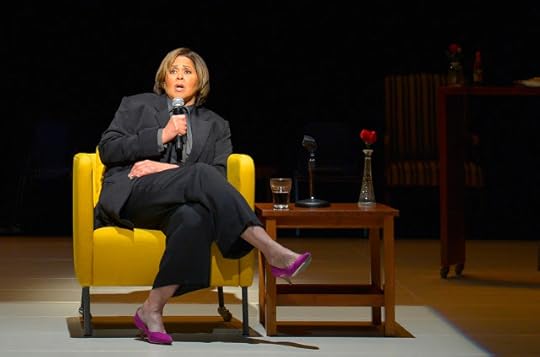 'For Anna Deavere Smith, actress and path-breaking performance artist, Baltimore is home. After the arrest and death of Freddie Gray, the city became a sadly appropriate setting for Smith to tackle her latest project Notes from the Field: Doing Time in Education a one-woman show about the "school to prison pipeline," which funnels children who get into trouble at school into the criminal justice system. +PBS NewsHour's Jeffrey Brown reports.'
'For Anna Deavere Smith, actress and path-breaking performance artist, Baltimore is home. After the arrest and death of Freddie Gray, the city became a sadly appropriate setting for Smith to tackle her latest project Notes from the Field: Doing Time in Education a one-woman show about the "school to prison pipeline," which funnels children who get into trouble at school into the criminal justice system. +PBS NewsHour's Jeffrey Brown reports.'
Published on September 30, 2015 10:45
September 29, 2015
Freedom in the Archive: Gregory Porter by Mark Anthony Neal
 Freedom in the Archive: Gregory Porterby Mark Anthony Neal | @NewBlackMan | NewBlackMan (in Exile)
Freedom in the Archive: Gregory Porterby Mark Anthony Neal | @NewBlackMan | NewBlackMan (in Exile)On stage at Page Auditorium on Duke University’s campus, Gregory Porter was a gracious leader, gregarious even with his interactions with a crowd that would give him standing ovations before the evening came to a close. Behind the generous spirit and jovial demeanor, it is easy miss how deeply political Porter’s music is.
Porter opened his set with a bouncy, earnest rendition of Donny Hathaway’s “Someday We’ll All Be Free” and closed with his own “1960 What?”—in between Porter offered commentary on the prison industrial complex, Black fatherhood, the corporate takeover of popular music, and dare I say, #AllBlackLivesMatter. That nobody felt as though they were victimized by a badly orchestrated (though exquisitely arranged) protest rally has everything to do with Porter’s deft manipulation of the archive of 20th Century Black musical idioms.
Porter’s version of “Someday We’ll All Be Free”—one of the more well known songs from an artist who had few hits and is relatively obscure among general pop audiences—found him in a hopeful mood; as hopeful perhaps as Hathaway was penning the song (with Edward Howard), as he did, with the waning moments of the Civil Rights and Black Power movements as backdrop, and Marvin Gaye’s What’s Going On as blueprint for the melodies of protest. Porter’s subtle revision of one of the song’s lyrics—“keep your manly pride” remixed as “keep your manly and womanly pride” was evidence that Porter is both aware and self reflective of the moment we are in.
Porter followed the opening tune with his own “On My Way to Harlem” from his breakthrough recording Be Good (2012). A track that one might expect Porter to open his set with, instead allowed Porter to name-drop himself into a cultural narrative that still resonates for the denizens of Classic Black—Classic American—culture. With every new male jazz singer being hailed as the new—fill in the blank—mentions of Ellington, Langston Hughes and oddly Marvin Gaye, as part of the landscape of the capital of 20th century Blackness, earns Porter some street-cred, on the streets that, for example, might take one to Jazz at Lincoln Center.
But even as Porter gestures towards his own place in that narrative--a gesture that the audience gladly affirmed--he is keenly aware that they very tradition that he stands on is being quietly eroded by the streaming music service of your choice. And Porter wasn’t afraid to connect the dots; his introduction to “Musical Genocide” (from his most recent Liquid Spirit) and mashed with The Temptations’ “Papa Was a Rolling Stone,” made clear his belief the attacks on musical tradition were veiled attacks on people who are sustained by this music.
As “Papa was a Rolling Stone” allowed Porter to delve into debates about Black fatherless--Porter and his siblings were raised by his single mother--Porter’s rendition of Nat Adderley’s 1960 classic “Work Song” was a reminder of the “changing same” that is the Prison Industrial Complex. That Porter began “Work Song” with a riff from “Berta, Berta”--a favorite of Black convict laborers in the early 20th Century--was not too fine a point about the realities of a timeless industry that is largely erected on perceptions--often based on myth--of Black criminality. And given David Guetta’s recent appropriation of “Rosie,” another convict laborer favorite, for his song “Hey Mama,” there seems to be some correlation between mass incarceration and the wholesaling of Black musical culture.
Those same perceptions get Black youth killed in what amounts to State sanctioned killings, as Porter attested to in his performance of “1960 What?” a song that gives musical side-eye to notions of social progress. While audiences can get all warm and fuzzy when Porter recalls Martin Luther King Jr.’s murder on the balcony of the Lorraine Motel--a national tragedy held at double-arms length--the unnamed Black teen-ager that gets shot dead with “three pieces of licorice” in the second verse of “1960 What?” by a police officer, was conjured by Porter two years before anyone knew the name Trayvon Martin, and four years before #Ferguson became a ground zero of a national crisis.
Still, what likely remained with audiences was the potent sweetness and swagger of Porter's instrument. Porter and his fine band, which included pianist Chip Crawford, keep the audience grounded by weaving ballads in throughout the set. Particular standouts were his rendition of the standard “Skylark,” his duet with Crawford on “Wolfcry” and his encore performance of “Real Good Hands.”
That there were folks in the audience that were likely disappointed Porter did not perform “Be Good (Lion’s Song)” or “Holding On,” his recent collaborations with Disclosure (of Sam Smith fame), speaks volumes about Porter’s potential reach. Here’s to hoping that as he reaches wider audiences that he remains committed to the very archive that provides the freedom to sing what he sings.
Published on September 29, 2015 20:32
Mark Anthony Neal's Blog
- Mark Anthony Neal's profile
- 30 followers
Mark Anthony Neal isn't a Goodreads Author
(yet),
but they
do have a blog,
so here are some recent posts imported from
their feed.



